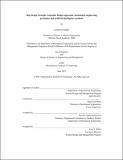Ship design through Axiomatic Design approach, sustainable engineering principles and artificial intelligence methods
Author(s)
Fardelas, Georgios
DownloadThesis PDF (13.97Mb)
Advisor
Kim, Sang-Gook
Terms of use
Metadata
Show full item recordAbstract
Environmental sustainability, as well as social and economic well-being, must be considered in every stage of a product lifecycle, from conceptual design to its retirement. Even though this sustainability-centric approach represents a critical driver for innovation, it also increases the design complexity. Nowadays, the maritime transport accounts for a large share of transport demand, and the importance of sustainable ship design is increasingly growing, not only for ethical and legislative but also for competitive reasons. The design of a sustainable ship considering all those aspects is a complex problem in this regard. One way to manage the complexity is to identify and address the functional couplings of the system at the early stage of the ship design. The Axiomatic Design methodology has been used for accommodating such a challenge in engineering systems design, and therefore, this thesis investigates the conceptual design of a merchant ship's conventional propulsion system with a view to the Axiomatic Design framework and known sustainable engineering principles. The Bayesian machine learning technique is proposed as a data-driven method for calculating the probability of achieving specific sustainability-related functional requirements, selecting the best design parameters among the proposed alternatives, and identifying hidden design couplings that the designers could not identify in the conceptual design stage. The case presented in this thesis can provide a scalable source for the total ship design following sustainable engineering principles in two aspects: 1) Axiomatic Design as a methodology to control the complexity of sustainable ship design and 2) Bayesian machine learning technique as a supportive tool for improving system's architecture and assessing system's sustainability impact.
Date issued
2021-06Department
Massachusetts Institute of Technology. Department of Mechanical Engineering; System Design and Management Program.Publisher
Massachusetts Institute of Technology